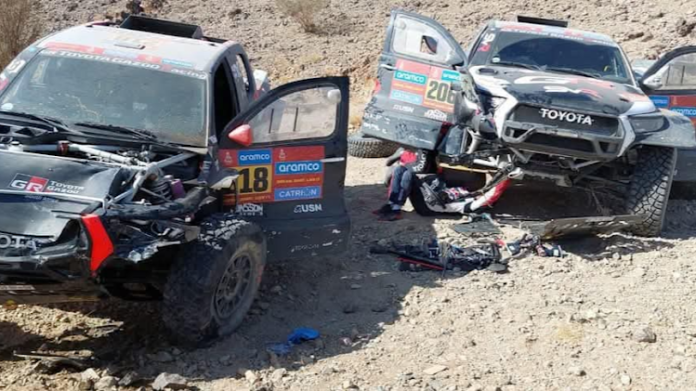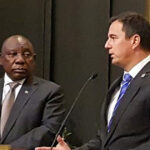A freak accident involving two Toyota Gazoo Racing Hilux drivers, Giniel de Villiers and Saood Variawa, has shaken up the leaderboard of the Dakar Rally. The South African teammates collided head-on in a dust cloud near the end of the gruelling 48-hour Chrono marathon stage on Monday. Remarkably, both drivers and their navigators escaped injury, but their vehicles sustained significant damage, costing them valuable time and positions.
The incident occurred approximately 40km from the finish line, as De Villiers explained: "It was all going very well until 40km from the end. Then there were quite a few cars together, about 11 of us, and we all were sort of in a 'dust train'. And then, unfortunately, some of the front guys lost the route. The navigation was quite tricky. I think Saood and Francois also struggled. They came back to find the right way, and we had a head-on collision in the dust. That's really unfortunate. We managed to fix the car, took some parts from Saood's car because his car is a bit more damaged than mine."
For De Villiers, a Dakar veteran and former winner competing in his final rally with Toyota, and his navigator Dirk von Zitzewitz, the crash was a devastating blow. They were holding a strong eighth position in the overall standings before the collision. Despite managing to complete the stage after improvising repairs using parts salvaged from Variawa's more severely damaged vehicle, they lost a significant 2 hours and 20 minutes, dropping them to 36th overall, 2 hours and 19 minutes behind the leader.
Variawa, in only his second Dakar Rally, and his navigator Francois Cazalet faced an even more challenging situation. The pair finished the stage a massive 8 hours and 4 minutes behind the leaders, a significant setback in their campaign. While the experience gained will be invaluable for the young driver, the focus will now shift to recovering lost time and supporting his teammates.
The 48-hour Chrono stage, now in its second year as part of the Dakar Rally in Saudi Arabia, presented unique challenges. Starting from the Bisha bivouac on Sunday, competitors navigated dunes, sandy tracks, and rocky terrain until racing was suspended at 5 pm local time. Crews spent the night at the nearest of six mini bivouacs before resuming racing at sunrise on Monday, setting off at one-minute intervals. The remaining distance varied depending on their overnight location, with approximately 350km to cover before the stage's end, followed by a short liaison back to Bisha.
Despite the setback for De Villiers and Variawa, there was some positive news for the Toyota Gazoo Racing team. Henk Lategan secured the overall lead after finishing fourth in the stage, establishing a comfortable four-minute and 45-second advantage over Saudi Arabia's Yazeed Al-Rajhi (Team Overdrive Hilux) and five-time Dakar winner Nasser Al-Attiyah (Dacia Sandrider) of Qatar.











